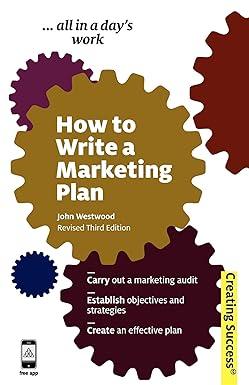Question
The Daily Grind recently heard from one of their long-time farming partners in El Salvador that their latest crop of beans was ruined as a
The Daily Grind recently heard from one of their long-time farming partners in El Salvador that their latest crop of beans was ruined as a result of disease. They have taken the necessary steps to mitigate the problem and introduced organic fungicides so it doesnt happen to future crops. However, this diseased crop will affect The Daily Grinds usual supply. How should The Daily Grind handle this situation?
- Stop offering that option until stock becomes more readily available. The Daily Grind currently offers seven different coffee options, including four single-origin coffees and three coffee blends. The crop that was affected by the disease is one of The Daily Grinds permanent coffees, not one that they rotate out regularly. It also happens to be the best- selling single-origin coffee, second in overall sales only to the house blendthis includes both brewed coffee-by-the-cup sales as well as retail sales (for one-pound bags of whole beans). In addition to lowering the number of coffees offered, dropping the El Salvador altogether would also require changing the menus, menu boards, signage, etc.
2. Find another grower in the same region with a similar avor prole. Because the president and CEO are tied up with other business, they would be unable to make a sourcing trip to El Salvador themselves. Therefore, buying beans from a different grower would require nding a reputable coffee broker to work with. Coffee brokers import unroasted (or green) beans from various origins to supply roasters with product. In the past, The Daily Grind tried to work with a broker, however they found the broker to be more interested in pushing the beans they already had in stock as opposed to nding the product The Daily Grind was looking for. As a result, this effort could require consulting with several brokers to nd the right one, then roasting and tasting small batch samples to nd a supplemental product that would hit the same notes as the El Salvadorian coffee they currently offer.
3. Buy pre-sourced and roasted beans from a previous crop at the same farm. When farmers crops yield more beans than they are able to sell directly to their roasting customers, they often sell the remainder to coffee brokers. With this option, The Daily Grind would have to reach out to their farming partner to try to track down extra product from last years crop. There is a chance that the product could not be available, even if they are able to nd the broker the farmer used. If this is the case, The Daily Grind would continue its search by reaching out to the farms other roasting clients to see if they could buy out their stock, likely at a premium, until they can purchase enough from other roasters to last until the farms next crop is available.
Step by Step Solution
There are 3 Steps involved in it
Step: 1

Get Instant Access to Expert-Tailored Solutions
See step-by-step solutions with expert insights and AI powered tools for academic success
Step: 2

Step: 3

Ace Your Homework with AI
Get the answers you need in no time with our AI-driven, step-by-step assistance
Get Started


